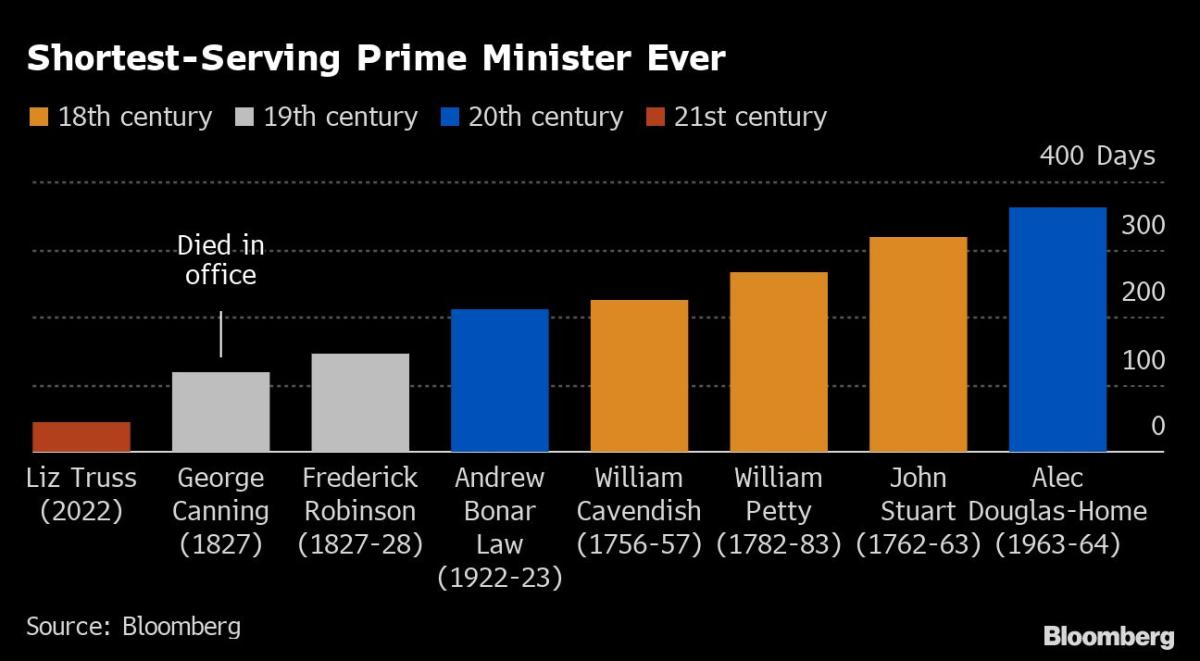
(Bloomberg) — From the death of its longest-reigning monarch to the arrival — and departure — of its shortest-serving prime minister, the UK endured a year of political and economic turmoil in 2022.
Most Read from Bloomberg
That’s largely down to the ruling Conservative Party, which ousted leaders Boris Johnson and Liz Truss and cycled through dozens of cabinet ministers. Lost in the melee was any sense of direction. A budget in March was followed by two statements in the fall that were budgets in all but name, the first of which tanked the pound and required the second to clear up the mess.
Here are some key numbers that help define an extraordinary 12 months.
49 Days
Truss spent fewer days in office than any prime minister before her. The previous record holder, George Canning, had 119 days in 10 Downing Street in the 19th century before he died of tuberculosis.
Truss took over from Johnson on a Tuesday in early September, and handed over to Rishi Sunak on a Tuesday seven weeks later having lost the confidence of financial markets and exacerbated a cost-of-living crisis by driving up mortgage costs for millions of Britons.
25,782 Days
Every future British leader will expect to beat Truss’s mark. But it will be hard for future monarchs to outlast the extraordinary reign of Queen Elizabeth II, which began on Feb. 6, 1952 and ended on Sept. 8. That was just two days after she appointed Truss — the 15th prime minister of her reign. Had they all been chased from office as quickly as Truss was, the total would have reached 526.
3 Leaders
There were three different prime ministers in 2022, the first year that’s happened since 1868, when Edward Smith-Stanley, the Earl of Derby, gave way to Benjamin Disraeli and then to William Gladstone. The country also had four Chancellors of the Exchequer and five education secretaries.
35 Hours
The time between Johnson’s office announcing one of those education secretaries, Michelle Donelan, late on July 5, and Donelan saying on Twitter early on July 7 that she’d already quit.
28 Ministers
Donelan’s was far from the only resignation in the 48 hours before Johnson himself announced his decision to step down on July 7. Five members of his cabinet quit, as well as 23 more junior ministers. Johnson also sacked a sixth cabinet minister, his old political foe Michael Gove, in a final act of revenge. In addition, 25 MPs resigned as parliamentary private secretaries — the most junior (unpaid) rung of government. Two more ministers quit on July 7 and 8.
126 Fines
“Partygate” played a major part in Johnson’s downfall. The probe into illicit lockdown-busting gatherings in Downing Street left him as the only prime minister found to have broken the law while in office. The scandal also embroiled Sunak, whose argument that he turned up early for a meeting — only to find people celebrating the premier’s birthday — didn’t wash with the police. A total of 126 fines were issued to 83 people, including Johnson’s wife Carrie.
206,700 Visas
Johnson’s ouster would likely have come much sooner were it not for Vladimir Putin and his war. The British prime minister made supporting Ukraine his top priority, and the UK issued £2.3 billion of military aid in 2022, a sum it’s committed to “match or exceed” next year. It also issued 206,700 visas to Ukrainians fleeing the war, and sanctioned 1,463 individuals with links to Russian aggression — up from the list of 183 at the beginning of the year who had been sanctioned since Russia’s 2014 annexation of Crimea.
£45 Billion
Truss came to power promising her party she would cut taxes, and her Chancellor of the Exchequer Kwasi Kwarteng duly delivered in their “Growth Plan” on Sept. 23. The £45 billion giveaway, the biggest in half a century, included a plan to abolish the upper 45% income tax rate, take a percentage point off the basic rate and scrap a scheduled corporation tax rise. The market turmoil which triggered the pair’s ultimate downfall was, presumably, unplanned.
$1.0350
The value of the pound — a record low against the dollar — three days after Truss and Kwarteng had unleashed their economic havoc. The yield on UK 30-year bonds surged to a 20-year high as prices collapsed, and the Bank of England had to intervene to prop up part of the bond market.
£25 Billion
The amount that Chancellor of the Exchequer Jeremy Hunt, who was parachuted in by a desperate Truss and stayed on under Sunak, then raised taxes in his Nov. 17 Autumn Statement. He also announced £30 billion of spending cuts as he sought to shore up the public finances, effectively consigning the Truss-Kwarteng era to painful economic history.
11.1%
The October inflation rate, the highest in four decades. Soaring prices formed the backdrop to 2022’s turmoil, and the central bank has raised the benchmark lending rate nine times to try to get inflation back toward the government’s 2% target. That included a 75 basis-point rise in November, the biggest in 33 years, and the benchmark rate now stands at a 14-year high 3.5%.
39 Points
The turmoil contributed to a record poll lead for the opposition Labour Party in a People Polling survey on Oct. 21. Redfield & Wilton Strategies gave Keir Starmer’s party a 36-point lead at its peak, while the more established YouGov had Labour 37 points ahead in October. YouGov still had the Conservatives 25 points behind in a Dec. 14-15 survey, a major challenge for Sunak as he prepares for the next general election due by January 2025 at the latest.
6 Days
Sunak promised a return of sober politics, yet it was anything but in his first days in office. His decision to reappoint Suella Braverman as home secretary — less than a week after she was pushed out of the same role by Truss for breaking ministerial rules — caused a furor that only subsided when a bullying scandal around another Sunak appointee, Gavin Williamson, blew up instead. The prime minister may yet regret putting Braverman in his cabinet as she pushes her right-wing agenda including on immigration.
33,029 People
The number of migrants reaching the UK in small boats through the end of September, more than the annual record 28,526 in 2021, quarterly data show. Home office figures show more than 12,500 cross-channel arrivals since. Sunak and Braverman face intense pressure within the Tory party to act, and the premier this month announced a plan to clear the backlog in processing asylum seekers by the end of 2023. But the government’s refusal to open more routes to the UK that it would regard as legal will continue to put it on a collision course with human rights groups, lawyers and the courts.
417,000 Days
The number of working days lost to industrial action in October, the biggest monthly total since November 2011, showing there is no end in sight to the UK’s turmoil. Nurses, postal workers, railway staff and ambulance drivers are joining in, and Capital Economics estimates December’s total will reach 1.5 million working days, which would be the most since July 1989 under Margaret Thatcher. National Health Service staff especially have public support for strike action, and that’s bad news for Sunak and his Conservatives.
Most Read from Bloomberg Businessweek
©2022 Bloomberg L.P.




